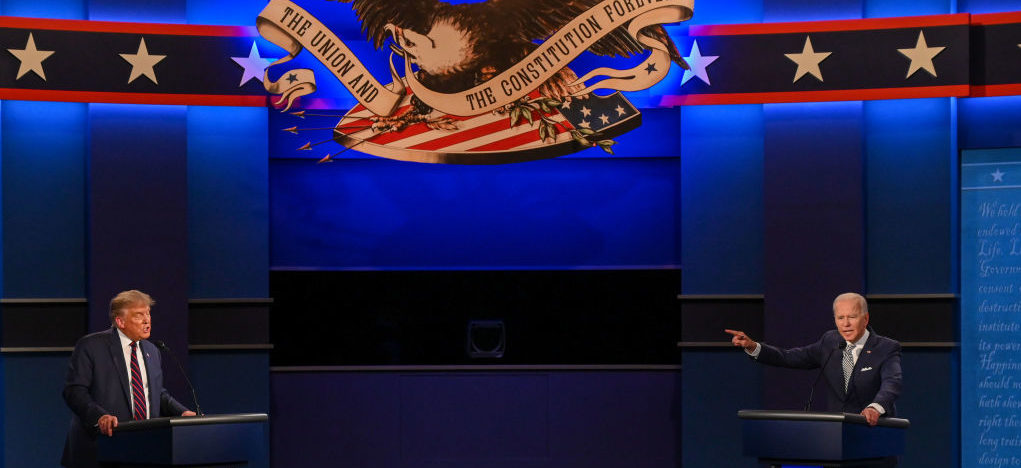Watching yesterday’s presidential debate stage occupied by two ageing men — tired-looking, ersatz “tough guys” in their mid-70s — many viewers might have found themselves wondering: what will come next? As 74-year-old Donald Trump and 77-year-old Joe Biden traded barbs and interrupted each other, the question loomed large and unanswered, as both candidates failed to outline a bold vision for the next generation. It felt like a tacit acknowledgement of a nation in decline.
On the subject of decline, much of the speculation surrounding the first presidential debate centred on Biden’s alleged cognitive decline, rather than the nation’s.
The speculation came to nought. Biden stood in front of harried moderator Chris Wallace for 90 minutes and answered the questions put to him, sometimes hesitatingly but occasionally with poise or swagger not seen in his earlier Democratic primary debate performances — and perhaps not even since his unfortunate 1988 presidential campaign in which he plagiarised speeches and misstated his academic record.
Equally, concerns over the debate as a tool of legitimising Trump were overstated, particularly in the context of American presidential debates more akin to popularity or personality contests than formal displays of forensic derring-do in the Oxford Union tradition.
Viewers were given the impression of a belligerent Trump attempting to invigorate his base even as he angered or demoralised Biden’s supporters. Meanwhile, Biden sought to position himself as a caretaker with a steady hand, a moderate who emphasised that he had beaten left-leaning rival Bernie Sanders “by a hell of a lot” and as the nominee stood for “the Democratic Party right now”.
Trump chose to root himself firmly in the present moment, providing a simple enough basis for supporting him: he and the Republican-controlled Senate have the necessary votes for confirming Supreme Court nominee Amy Coney Barrett; for enforcing “law and order” and standing with law enforcement against Antifa and the “radical Left”; for continuing to advocate reopening the country’s schools and businesses in spite of a rising Covid-19 death toll; and for achieving a number of vague and as-yet unfulfilled America First objectives dating back to his 2016 campaign.
Biden played down what moderates might call the radical excesses of his party, saying to undecided voters that he represented a safe, reliable choice.
But notably absent was much discussion of America’s future, its evolving role in the world economy alongside an ascendant China and its contribution to the mitigation of climate change. Biden signalled awareness of the latter problem, as nearly every member of his party does, while Trump offered some half-hearted acknowledgement that climate change is occurring.
The larger concern, of course, is not what will happen immediately after this election but what will happen in the ensuing years. Although Republicans such as Josh Hawley and Marco Rubio are trying, in various ways, to articulate their own vision of a “Right-wing populism” it is difficult to see how this will develop given the wide shadow Trump casts. He, much more than Biden, literally embodies the party; nearly every major national story involving the Republicans since 2015 has been a Trump story.
And Joe Biden, for all his superficially appealing moderation, represents the distant past of the Democratic Party, a centre-Right vestige of the late 1970s pro-business youth movement in the party grown old.
Even as many pundits race to breathlessly announce that the future of the free world hinges on the outcome of the 2020 presidential election, it will decide very little in the long term. Either Trump will lose, opening the door for Republicans to engage in prolonged internecine combat over whose vision of conservatism will prevail, or Biden will, necessitating similar competition among Democrats. For now, the past represented by these two septuagenarians is anything but dead.
Oliver Bateman is a journalist and historian who lives in Pittsburgh. He is also a co-host of the “What’s Left?” podcast.











Join the discussion
Join like minded readers that support our journalism by becoming a paid subscriber
To join the discussion in the comments, become a paid subscriber.
Join like minded readers that support our journalism, read unlimited articles and enjoy other subscriber-only benefits.
Subscribe